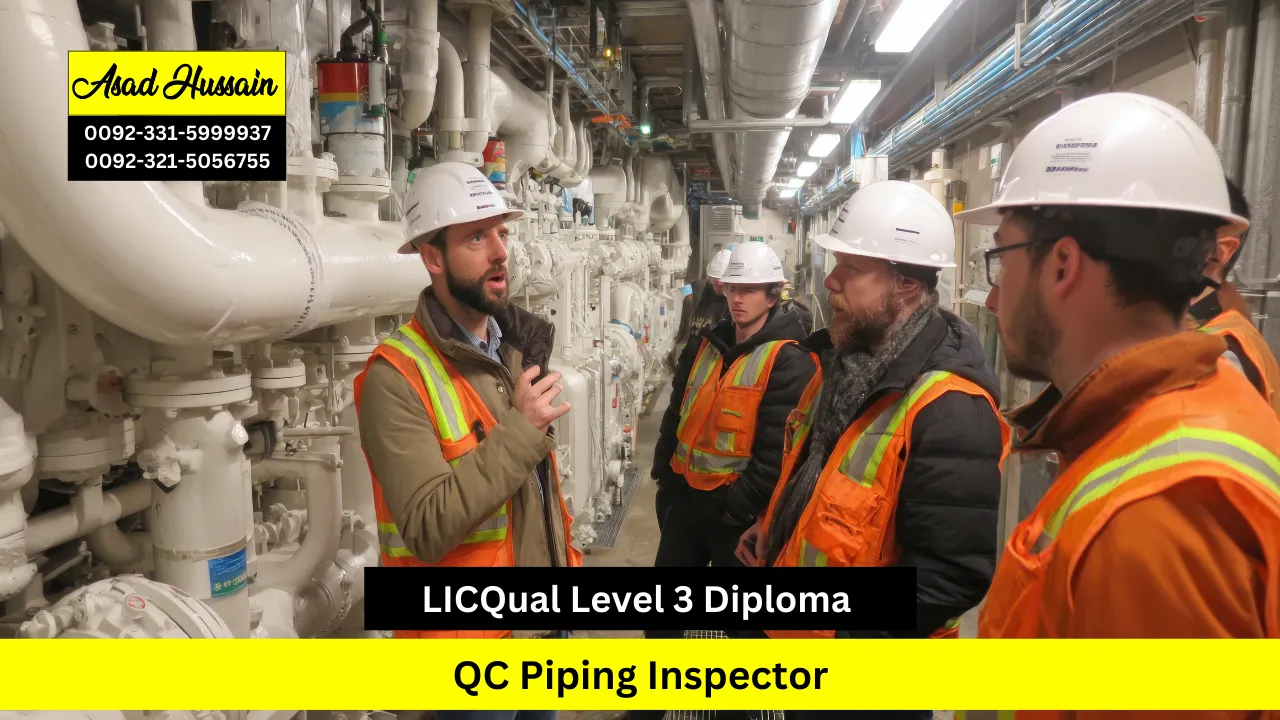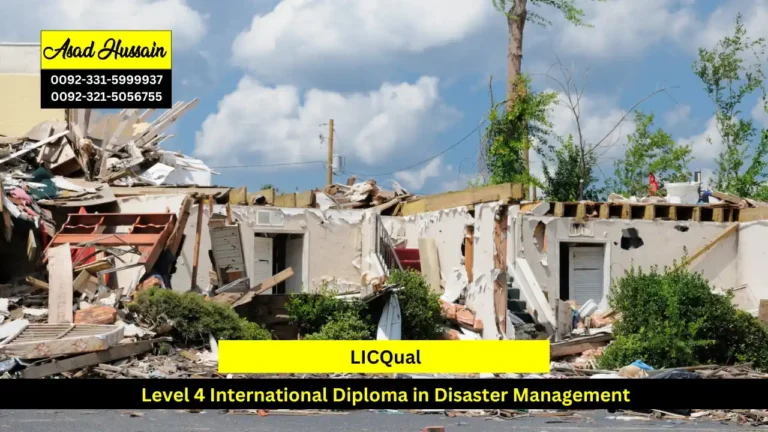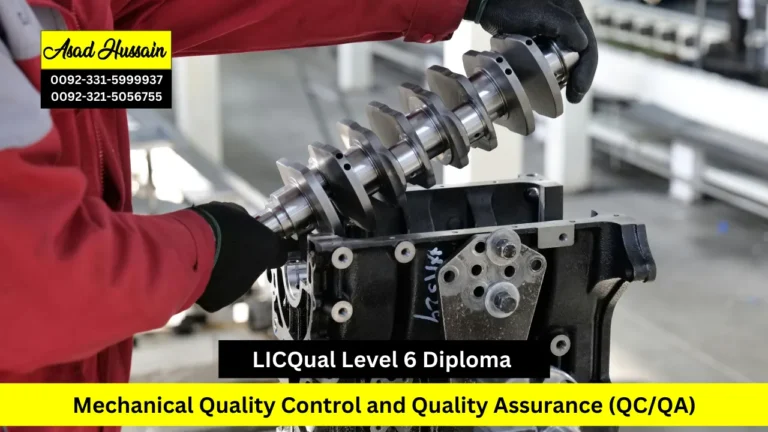Ensuring the integrity, safety, and performance of industrial piping systems is a critical aspect of mechanical and construction projects. The LICQual Level 3 Diploma in QC Piping Inspector is designed to provide learners with foundational knowledge and practical skills required to perform effective inspections, quality control, and compliance checks on piping systems.
LICQual Level 3 Diploma in QC Piping Inspector offers a comprehensive understanding of piping QC principles, inspection techniques, safe handling practices, and regulatory requirements. Learners will gain hands-on experience in assessing piping materials, identifying defects, implementing quality control procedures, and maintaining accurate documentation for audits and compliance. By combining theoretical learning with practical applications, the LICQual Level 3 Diploma in QC Piping Inspector equips participants to bridge knowledge with real-world inspection challenges effectively.
Participants will develop essential skills in piping system inspection, risk assessment, slinging and lifting operations, reporting, and adherence to industry standards. Emphasis is placed on understanding the characteristics of piping materials, safe operation of inspection equipment, and effective communication of inspection findings to ensure operational safety and quality assurance.
Upon completion of the LICQual Level 3 Diploma in QC Piping Inspector, learners will be capable of performing thorough inspections, identifying potential risks, and contributing to the maintenance of high-quality piping installations. LICQual Level 3 Diploma in QC Piping Inspector prepares learners for roles such as QC Piping Inspector, Mechanical QA/QC Technician, or Site Inspection Officer, providing them with recognized certification that validates their competence and enhances employability in industrial, construction, and mechanical engineering environments.
Program Highlights
Mandatory Units
- Piping Codes and Standards (ASME, API, ANSI, ISO)
- Welding Inspection and NDT Fundamentals
- Piping Fabrication, Erection, and Installation Monitoring
- Dimensional Inspection, Tolerances, and Alignment Checks
- Inspection Documentation, Reporting, and Quality Records
- Practical Applications in QC Piping Inspection
The LICQual Level 3 Diploma in QC Piping Inspector is designed for learners aiming to develop foundational skills in piping inspections, quality control, and compliance management. To ensure candidates are fully prepared for the program, the following entry requirements apply:
1. Age Requirements
- Applicants must be at least 18 years old to enroll in the course.
2. Educational Requirements
- Minimum of a Level 2 qualification in Mechanical Engineering, Piping Technology, Industrial Technology, or a related technical field.
- Equivalent professional certifications or practical experience in piping or QC roles may also be considered.
3. Professional Experience
- Preferably 1–2 years of experience in industrial piping, mechanical maintenance, QA/QC, or site inspection roles.
- Exposure to compliance, safety standards, and piping operations is advantageous.
4. English Language Proficiency
- Non-native English speakers must provide evidence of proficiency, such as IELTS 5.5+ or equivalent, to ensure understanding of course content and assessments.
The LICQual Level 3 Diploma in QC Piping Inspector equips learners with the essential knowledge, technical skills, and practical expertise required to perform effective inspections and quality control in industrial piping projects. Graduates will gain the competence to ensure compliance with international standards, enhance operational safety, and contribute to high-quality piping installations.
1. Piping Codes and Standards (ASME, API, ANSI, ISO)
- Understand and interpret key piping codes and standards relevant to industrial projects.
- Apply ASME, API, ANSI, and ISO standards to ensure piping compliance during inspections.
- Evaluate piping systems and components for conformity with regulatory and industry standards.
- Integrate code requirements into daily QC practices and inspection planning.
2. Welding Inspection and NDT Fundamentals
- Demonstrate foundational knowledge of welding processes and their impact on piping integrity.
- Conduct basic non-destructive testing (NDT) techniques to identify welding defects.
- Interpret NDT results and recommend corrective actions for non-conformities.
- Apply inspection principles to enhance welding quality and ensure safety compliance.
3. Piping Fabrication, Erection, and Installation Monitoring
- Monitor fabrication and erection activities to ensure adherence to project specifications.
- Identify defects or deviations during piping installation and recommend corrective measures.
- Apply best practices to ensure structural integrity and operational efficiency of piping systems.
- Coordinate effectively with project teams to maintain quality throughout installation.
4. Dimensional Inspection, Tolerances, and Alignment Checks
- Perform dimensional inspections of piping components using appropriate measurement tools.
- Evaluate tolerances, alignment, and fit-up to ensure compliance with project specifications.
- Identify misalignments or deviations and implement corrective actions.
- Ensure that piping systems meet precision, safety, and performance requirements.
5. Inspection Documentation, Reporting, and Quality Records
- Prepare accurate inspection reports and maintain detailed quality records.
- Document non-conformities and corrective actions in compliance with regulatory requirements.
- Apply reporting procedures to support audits and internal QC reviews.
- Utilize documentation to enhance accountability and traceability in QC processes.
6. Practical Applications in QC Piping Inspection
- Conduct real-world inspections under supervision to apply theoretical knowledge.
- Demonstrate competency in identifying defects, performing NDT, and verifying compliance.
- Integrate inspection findings into overall quality management practices.
- Develop practical problem-solving skills to ensure effective QC in piping projects.
The LICQual Level 3 Diploma in QC Piping Inspector is designed for individuals aiming to build foundational knowledge and practical skills in piping inspections, quality control, and compliance. This course is ideal for learners seeking to enter or advance in industrial, mechanical, and construction environments where maintaining the integrity and safety of piping systems is essential.
Educational Instructors and Trainers
- Professionals teaching mechanical engineering, piping systems, or quality control principles.
- Individuals looking to incorporate practical QC inspection skills into their training programs.
Environmental Advocates and Activists
- Professionals promoting sustainable and safe piping practices.
- Individuals focused on ensuring compliance with environmental regulations while maintaining quality standards.
Research and Development Teams
- Engineers and technical specialists involved in piping system design, testing, or optimization.
- Professionals aiming to apply QC inspection techniques to improve system reliability and performance.
Corporate Social Responsibility (CSR) Professionals
- Individuals integrating quality control and safety practices into corporate responsibility initiatives.
- Professionals ensuring industrial operations meet both compliance and sustainability objectives.
Students and Recent Graduates
- Learners seeking recognized certification in QC piping and mechanical quality management.
- Individuals aiming to start a career in industrial QA/QC, mechanical inspection, or site supervision.
Career Changers
- Professionals from related engineering or technical fields looking to specialize in QC piping inspection.
- Individuals seeking to broaden career opportunities in quality assurance, inspection, and industrial project management.
Policy Makers and Regulators
- Professionals responsible for developing, enforcing, or monitoring standards and safety regulations in piping projects.
- Individuals requiring practical knowledge of QC inspection processes to inform policy and regulatory decisions.
This course equips learners with the technical knowledge, practical inspection skills, and professional competencies necessary to ensure high-quality piping installations and maintain compliance with industry standards. Graduates will be prepared to pursue roles such as QC Piping Inspector, Mechanical QA/QC Technician, or Site Inspection Officer, enhancing their career prospects in industrial, construction, and mechanical engineering sectors.







